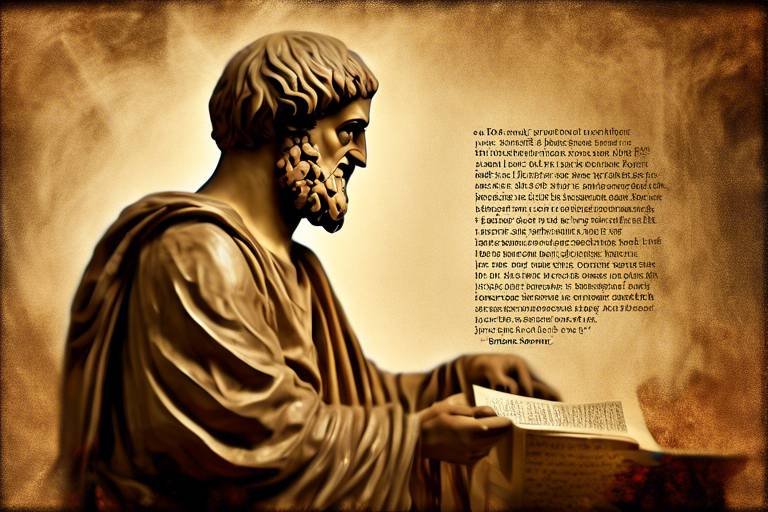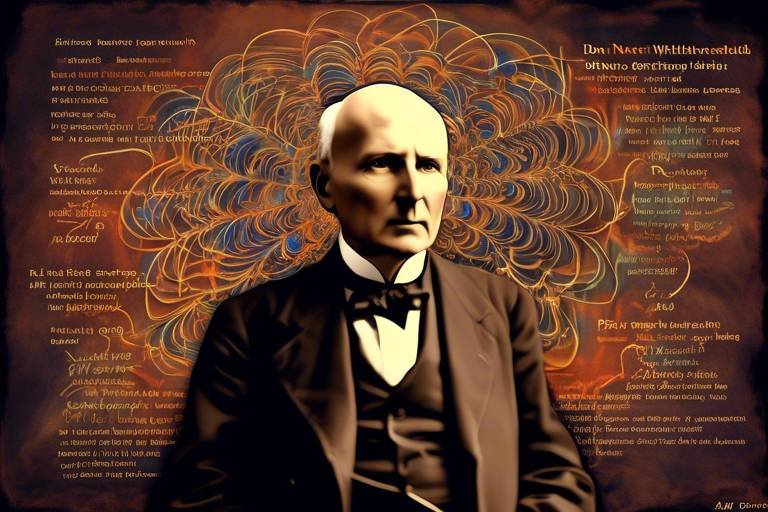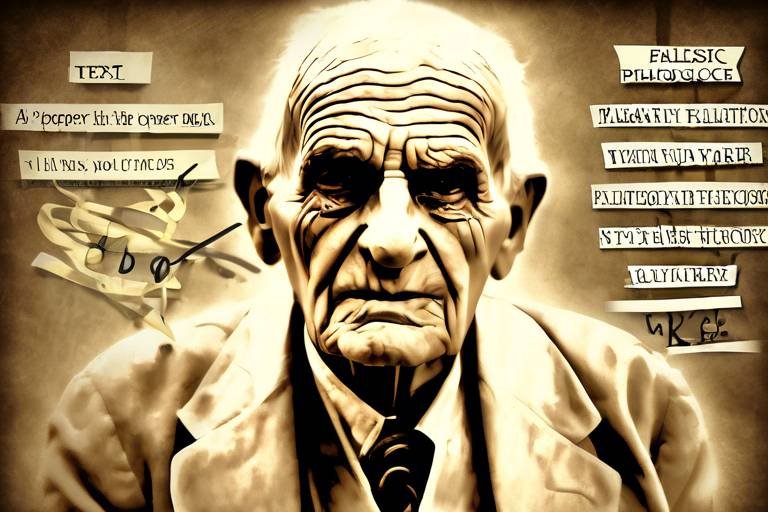Unpacking the Philosophy of Michel de Montaigne
Michel de Montaigne, a towering figure of the Renaissance, invites us into a world of introspection and inquiry. His unique approach to philosophy, characterized by skepticism and self-reflection, resonates deeply with contemporary discussions about human nature and personal identity. Montaigne's essays are not merely academic texts; they are personal explorations that challenge us to question our own beliefs and experiences. As we delve into his thoughts, we uncover not just the essence of his philosophy but also its relevance in today's fast-paced, often dogmatic world.
At the heart of Montaigne's work lies a profound skepticism that urges us to reconsider the absolute truths we often take for granted. He posits that instead of accepting ideas at face value, we should adopt a questioning attitude that fosters deeper understanding. This skepticism is not about rejecting knowledge outright; rather, it is about recognizing the limitations of our own perspectives and the complexities of the human experience. In doing so, Montaigne paves the way for a more nuanced exploration of ideas, encouraging us to embrace uncertainty as a vital part of our intellectual journey.
Another cornerstone of Montaigne's philosophy is the importance of self-reflection. He believed that to truly understand oneself, one must engage in a deep and honest examination of their thoughts, feelings, and actions. This introspective approach is not just a passive exercise; it is an active pursuit that leads to personal growth and a clearer sense of identity. In our modern lives, where distractions abound and self-awareness can be fleeting, Montaigne's call to introspection serves as a powerful reminder of the value of looking inward.
Experience plays a crucial role in Montaigne's philosophical framework. He asserts that our understanding of life and knowledge is profoundly shaped by our personal experiences. Montaigne often shares anecdotes from his own life, using them as illustrative tools to convey complex ideas. These stories are not mere embellishments; they are the very fabric of his philosophy, offering insights into the human condition. By connecting experience to knowledge, Montaigne illustrates that wisdom is not just found in books but in the lived realities that shape our perceptions and beliefs.
As we navigate through Montaigne's thoughts on human nature, we encounter a rich tapestry of ideas that reflect the duality of humanity. He acknowledges the inherent contradictions within us, recognizing that we are capable of both nobility and folly. This understanding of human complexity encourages us to embrace our imperfections and develop a more compassionate view of ourselves and others. In a world that often demands certainty and clear-cut answers, Montaigne's nuanced perspective invites us to appreciate the ambiguity of our existence.
The cultural context of the Renaissance significantly shaped Montaigne's philosophy. This period, marked by a revival of classical learning and humanistic ideals, influenced his views on education and the individual. Montaigne's writings reflect a deep engagement with the intellectual currents of his time, as he wrestled with the tensions between tradition and innovation. His work not only contributes to the philosophical discourse of his era but also lays the groundwork for future thinkers who would grapple with similar questions.
In conclusion, Montaigne's legacy is evident in the way his ideas continue to resonate with modern thought. His emphasis on skepticism, self-reflection, and the value of personal experience remains relevant as we navigate the complexities of contemporary life. By unpacking Montaigne's philosophy, we not only gain insight into his time but also uncover timeless truths that challenge us to think critically about our own beliefs and experiences.
- What is the main theme of Montaigne's philosophy?
Montaigne's philosophy revolves around skepticism, self-reflection, and the exploration of human nature. - How does Montaigne's skepticism influence modern thought?
His skepticism encourages a questioning attitude, promoting critical thinking and a deeper understanding of complex issues. - Why is self-reflection important in Montaigne's philosophy?
Self-reflection is crucial for personal growth and understanding one's identity, allowing individuals to engage more meaningfully with their experiences. - How did the Renaissance context shape Montaigne's ideas?
The Renaissance's humanistic ideals influenced Montaigne's views on education, individuality, and the importance of personal experience in acquiring knowledge.

The Essence of Skepticism
Michel de Montaigne, a towering figure of the Renaissance, was not just a philosopher; he was a master of skepticism. His approach to knowledge and truth was anything but conventional. Rather than accepting ideas at face value, Montaigne encouraged a questioning attitude that challenged the very foundations of what many considered absolute truths. Imagine walking through a dense fog where every step you take reveals a new layer of uncertainty—that's how Montaigne viewed the world. He believed that doubt is not a weakness but a powerful tool for intellectual exploration.
One of the most striking aspects of Montaigne's skepticism is his refusal to claim certainty about any topic. He famously stated, "What do I know?" This simple yet profound question encapsulates his belief that our understanding is always limited. In a world overflowing with information, how often do we pause to reflect on the validity of what we accept as truth? Montaigne's skepticism serves as a reminder that embracing uncertainty can lead to deeper insights and greater wisdom.
Moreover, Montaigne's doubts were not merely philosophical musings; they were deeply personal. He examined his own beliefs and experiences, allowing his skepticism to shape his worldview. This introspective approach invites us to consider our own biases and assumptions. Are we truly open to questioning our beliefs, or do we cling to them out of fear of the unknown? Montaigne's legacy lies in his ability to inspire us to embark on our own journeys of self-discovery and intellectual curiosity.
In essence, Montaigne's philosophy encourages a dynamic interplay between skepticism and understanding. He invites us to explore the complexities of life with an open mind, recognizing that the answers we seek may be elusive. This ongoing quest for knowledge, fueled by doubt and inquiry, is what makes Montaigne's philosophy so relevant today. It challenges us to remain vigilant in our pursuit of truth, reminding us that the journey is just as important as the destination.
To illustrate the impact of Montaigne's skepticism, consider the following table that summarizes his key contributions:
| Key Contribution | Description |
|---|---|
| Questioning Authority | Montaigne challenged established norms and beliefs, advocating for personal inquiry. |
| Embracing Uncertainty | He viewed doubt as a critical component of the learning process. |
| Personal Reflection | His skepticism was rooted in self-examination and introspection. |
| Influence on Modern Thought | Montaigne's ideas paved the way for later thinkers who valued skepticism and inquiry. |
In conclusion, Montaigne's essence of skepticism is not just a philosophical stance; it is a way of life. It encourages us to question, to reflect, and to grow. As we navigate through the complexities of modern existence, let us carry Montaigne's spirit with us, embracing the unknown and celebrating the beauty of uncertainty.
- What was Montaigne's main philosophical belief? Montaigne believed in the importance of skepticism and self-reflection as tools for understanding human nature and knowledge.
- How did Montaigne's skepticism influence later thinkers? His approach to questioning established norms paved the way for Enlightenment thinkers and contributed to modern philosophical discourse.
- Why is Montaigne's philosophy relevant today? In an age of information overload, Montaigne's emphasis on doubt and inquiry encourages critical thinking and personal growth.

Self-Reflection and the Self
When we think about self-reflection, it’s like holding up a mirror to our soul. Michel de Montaigne, the father of the essay, believed that understanding oneself is crucial for personal growth and authenticity. His philosophy urges us to dive deep into our thoughts and feelings, challenging us to ask: Who are we really? In a world that often pushes us to conform, Montaigne’s emphasis on introspection becomes a beacon, guiding us towards a more profound understanding of our identities.
Montaigne famously stated, “What do I know?” This simple question encapsulates his approach to self-examination. Rather than seeking absolute truths, he encouraged a journey of self-discovery through questioning and reflection. By examining our beliefs, motivations, and experiences, we can uncover layers of our identity that often remain hidden. Just like peeling an onion, each layer we shed reveals more about who we are, leading to a richer understanding of our existence.
Moreover, Montaigne's introspective approach serves as a powerful tool for personal development. By reflecting on our actions and decisions, we can learn from our mistakes, celebrate our successes, and ultimately shape our future selves. This process of self-reflection is not just a solitary endeavor; it can also be enhanced through conversations with others. Discussing our thoughts with friends or mentors can provide new perspectives, helping us see ourselves in a different light.
To illustrate this, let’s consider a few key aspects of Montaigne’s philosophy on self-reflection:
- Embracing Vulnerability: Montaigne believed that acknowledging our flaws and uncertainties is a strength, not a weakness. By being vulnerable, we open ourselves up to growth.
- Learning from Experience: He posited that our experiences, both good and bad, are vital to understanding ourselves. Each moment shapes our character and worldview.
- Questioning Assumptions: Montaigne encouraged us to challenge our preconceived notions about ourselves. This can lead to surprising revelations about our true nature.
In essence, Montaigne’s philosophy of self-reflection is not just about looking inward but also about engaging with the world around us. It invites us to question our beliefs, to learn from our experiences, and to embrace our authentic selves. By doing so, we can navigate the complexities of life with a greater sense of clarity and purpose.
As we delve deeper into self-reflection, we might find that it also acts as a compass, guiding us through life’s uncertainties. Just as a sailor uses the stars to navigate the sea, we can use our reflections to steer our course. Montaigne’s insights remind us that self-knowledge is not a destination but a lifelong journey, filled with discoveries that enrich our understanding of ourselves and the world.
- What is self-reflection? Self-reflection is the process of introspecting and examining one’s thoughts, feelings, and actions to gain a deeper understanding of oneself.
- How can I practice self-reflection? You can practice self-reflection through journaling, meditation, or engaging in deep conversations with trusted friends.
- Why is self-reflection important? Self-reflection is important because it helps us learn from our experiences, fosters personal growth, and enhances our understanding of our identity.

The Role of Experience
When we think about experience, it’s easy to see it as just a series of events that happen to us. But for Michel de Montaigne, experience was the very foundation of knowledge. He believed that understanding the world around us—and even ourselves—could only come through the lens of personal experience. Imagine trying to navigate a complex maze without ever having been inside it; you might have theories, but you wouldn’t truly understand the twists and turns until you’ve walked through it yourself. Montaigne’s philosophy emphasizes that life is not merely about accumulating facts or theories but about engaging with the world in a way that shapes our perceptions and beliefs.
In his essays, Montaigne often reflects on his own life experiences, using them as a backdrop to illustrate broader philosophical ideas. He understood that our individual journeys are what make us unique, and these journeys provide a rich tapestry of insights that can inform our understanding of human nature. For Montaigne, personal anecdotes weren't just stories; they were vital tools for philosophical exploration. They allowed him to draw connections between his life and the greater questions of existence, morality, and the human condition.
Consider the way he approached topics like friendship, love, and even death. By sharing his own stories, Montaigne invited his readers to reflect on their experiences. This method of using personal narratives not only made his philosophy more relatable but also encouraged others to engage in their own self-reflection. He was, in many ways, a mirror held up to society, asking us to look deeply at ourselves and our experiences.
Moreover, Montaigne’s belief that knowledge arises from lived experiences can be summarized in a few key ideas:
- Personal Engagement: Knowledge is not passive; it requires active participation in life.
- Reflection: It’s not enough to simply experience; one must also reflect on those experiences to derive meaning.
- Subjectivity: Each individual’s experience is unique, and thus, our understanding of knowledge is inherently subjective.
Through this lens, Montaigne’s philosophy becomes a call to arms for all of us to embrace our experiences, to learn from them, and to share them with others. It’s a reminder that every encounter, whether joyous or painful, contributes to our personal narrative and shapes our worldview. In a fast-paced world where we often rush through life, Montaigne’s insights encourage us to slow down, to savor our experiences, and to recognize their profound impact on our understanding of ourselves and the universe.
- What is the significance of experience in Montaigne's philosophy?
Experience serves as the foundation for knowledge, emphasizing that understanding arises from personal encounters and reflections. - How does Montaigne use personal anecdotes in his writings?
He uses anecdotes to illustrate philosophical points, making complex ideas more relatable and encouraging readers to engage in self-reflection. - Why is self-reflection important according to Montaigne?
Self-reflection allows individuals to derive meaning from their experiences, fostering personal growth and a deeper understanding of human nature.

Lessons from Personal Anecdotes
Michel de Montaigne was a master storyteller, weaving personal anecdotes into the fabric of his philosophical musings. These stories are not mere embellishments; they serve as profound lessons that resonate with the human experience. For Montaigne, anecdotes were a way to illustrate complex ideas in a relatable manner, transforming abstract concepts into tangible experiences. He believed that sharing personal stories could bridge the gap between the philosopher and the everyday person, making philosophy accessible to all.
One of Montaigne's most famous anecdotes revolves around his relationship with his father. He recounts how his father, in an effort to provide him with a classical education, insisted that Montaigne be raised with a unique approach: he would only speak Latin at home. This unusual upbringing, while well-intentioned, led to a profound realization for Montaigne about the limitations of education. He learned that while knowledge is essential, it must be tempered with understanding and empathy for the lived experiences of others. This story highlights the importance of balance in education and the need for a holistic approach to learning.
Another poignant example is Montaigne's reflection on death and mortality. He often shared personal experiences related to loss, allowing readers to connect with his vulnerability. In one instance, he describes the death of a close friend and how it profoundly impacted his outlook on life. This anecdote serves as a reminder of the transient nature of existence and encourages readers to cherish their relationships. Montaigne's ability to articulate such deeply personal experiences invites us to confront our own fears and uncertainties about death, fostering a sense of shared humanity.
Montaigne's anecdotes often come with a twist, challenging readers to rethink their assumptions. For instance, he recounts a story about a traveler who encounters a group of cannibals. Rather than condemning them, Montaigne uses this narrative to explore the concept of cultural relativism. He argues that what is deemed "civilized" or "barbaric" is often a matter of perspective. This lesson encourages us to question our biases and consider the broader context of human behavior, fostering a deeper understanding of diversity and acceptance.
Through these personal anecdotes, Montaigne illustrates that the essence of philosophy is not found solely in abstract reasoning but in the rich tapestry of human experience. His stories invite us to reflect on our own lives, encouraging a dialogue between our personal experiences and the philosophical questions that arise from them. As we navigate our own journeys, Montaigne's lessons remind us that every story has the potential to reveal deeper truths about ourselves and the world around us.

Connecting Experience to Knowledge
When we dive into the philosophical ocean of Michel de Montaigne, we quickly realize that his thoughts on knowledge are deeply intertwined with personal experience. Montaigne was not just a thinker who pondered abstract concepts in isolation; instead, he believed that our understanding of the world is profoundly shaped by the lives we lead and the experiences we encounter. Imagine trying to learn to ride a bike solely by reading a manual—sure, you might grasp the theory, but without that first wobbly ride, you wouldn’t truly understand what balancing feels like. This analogy encapsulates Montaigne's philosophy: knowledge is not merely a collection of facts but a tapestry woven from the threads of our lived experiences.
Montaigne's essays are rich with personal anecdotes that serve as a bridge between experience and knowledge. For instance, he often reflected on his own life events, illustrating how these shaped his understanding of human nature and morality. By sharing his stories, he invites readers to recognize that knowledge is not static; it evolves as we navigate through various life situations. This approach encourages a more dynamic view of learning, where experience is the teacher and wisdom is the lesson.
Furthermore, Montaigne posited that our subjective experiences allow us to grasp universal truths. He argued that the more we reflect on our individual journeys, the more we can connect with others' experiences, creating a shared understanding of humanity. In this sense, knowledge becomes a communal construct, built upon the foundation of diverse experiences. Montaigne’s assertion that “I am myself the matter of my book” reflects his belief that our personal narratives are essential to the broader discourse of knowledge.
To illustrate this connection further, consider the following table that summarizes key aspects of Montaigne's philosophy regarding experience and knowledge:
| Aspect | Description |
|---|---|
| Personal Anecdotes | Montaigne used his life stories to convey philosophical ideas, demonstrating how individual experiences can lead to deeper understanding. |
| Subjectivity | He emphasized that knowledge is shaped by personal perspectives, making it unique to each individual. |
| Universal Truths | Through reflection on personal experiences, one can uncover broader insights about human nature. |
In essence, Montaigne’s philosophy teaches us that knowledge is not just about accumulating information; it’s about engaging with life. Each experience we have adds a layer to our understanding, allowing us to connect the dots in ways that pure theory cannot. This realization is particularly relevant in today's fast-paced world, where we often overlook the importance of reflection and personal insight in our quest for knowledge. By embracing Montaigne’s ideas, we can cultivate a more profound appreciation for our experiences and their role in shaping who we are and what we know.
- What is the main idea of Montaigne's philosophy? Montaigne's philosophy emphasizes the importance of personal experience in shaping knowledge and understanding of human nature.
- How does Montaigne use anecdotes in his essays? He uses personal anecdotes to illustrate philosophical points, demonstrating how lived experiences inform our understanding of broader truths.
- Why is self-reflection important in Montaigne's thought? Self-reflection allows individuals to connect their experiences with their identity, leading to personal growth and deeper knowledge.

The Nature of Human Beings
When we dive into the philosophical musings of Michel de Montaigne, we uncover a rich tapestry of thoughts on the nature of human beings that is as intricate as it is enlightening. Montaigne, a man of the Renaissance, grappled with the complexities of humanity, presenting a view that was both nuanced and reflective. He understood that human nature is not a monolith; rather, it is a mosaic of conflicting emotions, desires, and moral dilemmas. In a world that often demands clear-cut answers, Montaigne's exploration of human duality serves as a refreshing reminder that our existence is filled with shades of gray.
One of the most compelling aspects of Montaigne's philosophy is his recognition of the inherent contradictions within us. He believed that to be human is to be flawed and imperfect. This idea resonates deeply in today's society, where the pressure to present a polished version of ourselves can lead to disillusionment and anxiety. Montaigne’s thoughts encourage us to embrace our imperfections, suggesting that they are what make us truly human. He famously stated, “I am myself the matter of my book,” which implies that our experiences, both good and bad, shape our identities.
Montaigne also delved into the moral dimensions of human nature. He pondered questions such as: What drives us to act? Are we inherently good or evil? These inquiries are not merely academic; they touch on the very core of our existence. Montaigne suggested that our moral behavior is influenced by a myriad of factors, including cultural context, personal experiences, and social interactions. He argued that understanding the motivations behind our actions is crucial for self-awareness and personal growth.
To illustrate his point, Montaigne often drew on personal anecdotes, using his life experiences as a lens through which to examine broader philosophical questions. For instance, he reflected on his own struggles with fear and doubt, showcasing how these emotions are universal among humans. This approach not only makes his philosophy relatable but also emphasizes that our shared experiences can foster a deeper understanding of one another. In essence, Montaigne's reflections remind us that we are all navigating the same turbulent waters of existence, often seeking answers to questions that have no definitive solutions.
Additionally, Montaigne's exploration of human nature is intricately linked to his views on knowledge. He believed that knowledge is not merely a collection of facts but is deeply rooted in our lived experiences. This perspective challenges the traditional notion of knowledge as something to be acquired through study alone. Instead, Montaigne posited that true understanding arises from the synthesis of experience and reflection. He famously remarked, “The greatest thing in the world is to know how to belong to oneself,” highlighting the importance of self-knowledge in navigating the complexities of human nature.
In summary, Montaigne's philosophy on the nature of human beings presents a profound exploration of our dualities, moral behaviors, and the significance of experience in shaping our identities. His insights encourage us to embrace our flaws and recognize the shared struggles that bind us as humans. As we continue to navigate the complexities of modern life, Montaigne's reflections remind us that understanding ourselves is a lifelong journey, one that is as rewarding as it is challenging.
- What is Montaigne's view on human nature? Montaigne believed that human nature is complex and filled with contradictions, emphasizing the importance of self-reflection and personal experiences.
- How did Montaigne use personal anecdotes in his philosophy? He used anecdotes to illustrate his philosophical points, making his ideas relatable and grounded in real-life experiences.
- What role does experience play in Montaigne's understanding of knowledge? Montaigne argued that true knowledge arises from lived experiences rather than mere academic study.

The Influence of Cultural Context
Michel de Montaigne's philosophy did not emerge in a vacuum; rather, it was profoundly shaped by the cultural and historical context of the Renaissance. This period was characterized by a resurgence of interest in classical thought, humanism, and a questioning of traditional authority. Montaigne, living in France during the late 16th century, was influenced by these currents of thought, which encouraged a more personal and subjective approach to understanding the world. His skepticism and emphasis on individual experience were not just personal philosophies but were reflective of a broader cultural shift towards valuing human experience and inquiry.
During the Renaissance, there was a notable shift from the medieval focus on religious dogma to a more human-centric worldview. This change allowed Montaigne to explore ideas that questioned the very foundations of knowledge and truth. He famously stated, "I am myself the matter of my book," which encapsulates his belief that personal experience is paramount in the quest for understanding. In this sense, Montaigne's writings can be seen as a mirror reflecting the intellectual climate of his time, where the individual began to assert their own voice against the backdrop of established norms.
Moreover, Montaigne's philosophy is deeply intertwined with the concept of Renaissance humanism. This intellectual movement emphasized the potential of human beings and the importance of education, classical literature, and the arts. Montaigne's essays often draw on classical references, showcasing how the thoughts of ancient philosophers informed his reflections. He believed that education should not just aim to impart knowledge but should also cultivate the individual’s character and moral judgment. This holistic view of education was revolutionary and contributed to shaping modern educational philosophies.
To illustrate the profound impact of cultural context on Montaigne's thought, consider the following table that highlights key aspects of Renaissance humanism and their influence on his philosophy:
| Aspect of Renaissance Humanism | Influence on Montaigne |
|---|---|
| Emphasis on Individualism | Montaigne's focus on personal experience and self-examination. |
| Revival of Classical Learning | Integration of ancient philosophical ideas into his essays. |
| Questioning of Authority | Development of a skeptical approach to knowledge and truth. |
| Human Potential and Education | Advocacy for education that fosters moral and ethical development. |
As Montaigne navigated the complexities of his time, he also grappled with the cultural tensions between tradition and innovation. His essays reflect a deep awareness of the fluidity of human nature and the contradictions inherent in society. By engaging with the cultural context of the Renaissance, Montaigne not only articulated his own philosophical ideas but also contributed to a larger dialogue about what it means to be human in a rapidly changing world. His legacy is a testament to the power of cultural influences in shaping thought and the enduring relevance of his insights in contemporary discussions.

Renaissance Humanism
The philosophy of played a pivotal role in shaping the intellectual landscape of the time, and Michel de Montaigne was no exception to its influence. This movement, which emerged during the late 14th century and flourished through the 16th century, emphasized the value of human beings, individualism, and the study of classical texts. Montaigne, with his unique blend of skepticism and introspection, adopted many of these humanist ideals, which can be seen clearly in his essays.
At the heart of Renaissance Humanism was a profound respect for classical antiquity. Thinkers of this period believed that by revisiting the works of ancient Greece and Rome, they could unlock the secrets to a more fulfilling and meaningful life. Montaigne's essays often reflect this sentiment, as he draws upon the wisdom of ancient philosophers like Socrates and Aristotle to explore the complexities of human nature. His writings serve as a bridge between the past and the present, showcasing how the lessons of history can inform contemporary thought.
Moreover, Montaigne's humanism was deeply personal. He believed in the importance of understanding oneself as a way to understand others. This self-reflective approach is a hallmark of humanist thought, which posits that by examining our own experiences, we can gain insights into the broader human condition. Montaigne famously stated, "What do I know?"—a question that encapsulates his humanist ethos. This introspection not only fosters personal growth but also cultivates empathy and understanding towards others.
In addition, Montaigne's emphasis on education aligns closely with humanist principles. He championed the idea that education should not merely be about rote memorization but should encourage critical thinking and the pursuit of knowledge for its own sake. This perspective is particularly relevant today, as we navigate an increasingly complex world where the ability to think critically is more important than ever. Montaigne believed that a well-rounded education could empower individuals to become better citizens, capable of contributing positively to society.
Furthermore, the impact of Renaissance Humanism on Montaigne's writings can be seen in his approach to morality and ethics. Rather than adhering to rigid dogmas, Montaigne advocated for a more nuanced understanding of moral behavior, one that considers the context of individual circumstances. This flexibility is a reflection of the humanist belief in the potential for human reason and judgment. By prioritizing personal experience and reflection, Montaigne invites readers to engage in their own moral inquiries, making ethics a personal journey rather than a one-size-fits-all doctrine.
In summary, Montaigne's philosophy is deeply intertwined with the ideals of Renaissance Humanism. His focus on self-examination, the value of education, and the importance of understanding the human experience all echo the core tenets of this transformative movement. As we continue to explore Montaigne's work, we uncover a rich tapestry of ideas that not only resonate with the Renaissance but also remain relevant in our modern discourse.
- What is Renaissance Humanism?
Renaissance Humanism is an intellectual movement that emerged in the late 14th century, focusing on the study of classical texts and emphasizing the value of human beings and individual potential.
- How did Montaigne contribute to Renaissance Humanism?
Montaigne contributed by emphasizing self-reflection, critical thinking in education, and a nuanced approach to ethics, all of which align with humanist ideals.
- Why is self-examination important in Montaigne's philosophy?
Self-examination allows individuals to understand themselves better, which in turn fosters empathy and understanding towards others, a key aspect of humanism.

Impact on Modern Thought
Michel de Montaigne's influence on modern thought is profound and far-reaching, marking him as a pivotal figure in the evolution of contemporary philosophy. His skepticism and emphasis on self-reflection resonate strongly in today's discussions about identity, knowledge, and morality. In a world where information is abundant yet often misleading, Montaigne's call for critical thinking and personal inquiry feels more relevant than ever. He challenged the notion of absolute truths, paving the way for a more nuanced understanding of knowledge that incorporates personal experience and subjective perspectives.
One of the most significant ways Montaigne has shaped modern thought is through his exploration of the self. He introduced the idea that understanding oneself is essential to understanding the world. This introspective approach has become a cornerstone of modern psychology and existential philosophy. Think about it: how often do we hear the phrase "know thyself" in discussions about mental health and personal development? Montaigne's insistence on self-examination encourages us to reflect on our beliefs, values, and experiences, fostering a deeper connection with our own identities.
Moreover, Montaigne's use of personal anecdotes to illustrate philosophical concepts has influenced countless writers and thinkers. By grounding abstract ideas in real-life experiences, he made philosophy accessible and relatable. This narrative style can be seen in the works of modern essayists and memoirists who blend personal stories with broader philosophical inquiries. For instance, writers like Virginia Woolf and Joan Didion have adopted this technique, allowing readers to engage with complex ideas through the lens of personal experience.
In addition, Montaigne's skepticism has laid the groundwork for modern scientific inquiry and critical thinking. His belief that knowledge is provisional and subject to change encourages a mindset that values questioning and exploration. This is particularly evident in the scientific method, which relies on experimentation and validation rather than acceptance of dogma. Montaigne's ideas challenge us to remain curious and open-minded, qualities that are essential in an age where misinformation can spread rapidly.
To illustrate Montaigne's enduring impact, let’s look at some key areas of modern thought influenced by his philosophy:
| Area of Influence | Description | Notable Thinkers |
|---|---|---|
| Existentialism | Focus on individual experience and self-reflection. | Sartre, Kierkegaard |
| Postmodernism | Questioning of grand narratives and absolute truths. | Foucault, Derrida |
| Cognitive Psychology | Emphasis on personal experience in shaping behavior and thought. | Bandura, Beck |
Ultimately, Montaigne's legacy lives on through the ways we engage with our own thoughts and the world around us. His philosophy encourages us to embrace our complexities, question our assumptions, and seek understanding through both personal and collective experiences. In a rapidly changing world, Montaigne's insights remind us that the journey of self-discovery and knowledge is ongoing, and that our perspectives are shaped by the myriad experiences we encounter.
- What is the main idea of Montaigne's philosophy? Montaigne's philosophy emphasizes skepticism, self-reflection, and the importance of personal experience in shaping knowledge and understanding of human nature.
- How did Montaigne influence modern psychology? His focus on introspection and self-examination laid the groundwork for modern psychological practices that encourage individuals to explore their identities and experiences.
- Why is skepticism important in Montaigne's work? Skepticism allows for a questioning attitude towards absolute truths, fostering critical thinking and open-mindedness, which are essential in contemporary discourse.
- Can Montaigne's ideas be applied today? Absolutely! Montaigne's insights into self-reflection and the nature of knowledge are highly relevant in today's discussions about identity, morality, and the pursuit of truth.
Frequently Asked Questions
- What is the main theme of Montaigne's philosophy?
Montaigne's philosophy centers around skepticism, self-reflection, and a deep exploration of human nature. He encourages questioning established truths and emphasizes the importance of personal experiences in shaping our understanding of the world.
- How does Montaigne's skepticism influence his views?
Montaigne's skepticism leads him to challenge the notion of absolute truths. He believes that embracing doubt fosters a more open-minded approach to knowledge, allowing for a richer understanding of life and our place within it.
- Why is self-reflection important in Montaigne's work?
Self-reflection is crucial for Montaigne as it aids in personal growth and identity formation. By examining our thoughts and experiences, we can gain insights into our behavior and motivations, ultimately leading to a more authentic self.
- What role do personal anecdotes play in Montaigne's philosophy?
Personal anecdotes serve as powerful tools in Montaigne's writing. They illustrate his philosophical points, making abstract ideas more relatable and accessible. These stories highlight the complexities of human nature and the lessons learned from lived experiences.
- How does Montaigne connect experience to knowledge?
Montaigne posits that knowledge is derived from our lived experiences. He argues that understanding comes not from theoretical concepts alone but from engaging with the world and reflecting on those interactions.
- What does Montaigne say about human nature?
Montaigne presents a nuanced view of human nature, recognizing its duality. He explores themes of morality, behavior, and the complexities that define what it means to be human, illustrating that we are often a mix of contradictions.
- How did the Renaissance influence Montaigne's philosophy?
The cultural and historical context of the Renaissance profoundly shaped Montaigne's ideas. The humanist movement emphasized individualism and education, which influenced his thoughts on personal development and the importance of self-knowledge.
- In what ways has Montaigne's philosophy impacted modern thought?
Montaigne's ideas have left a lasting legacy on modern philosophy, influencing thinkers across various disciplines. His emphasis on skepticism, personal experience, and introspection continues to resonate in contemporary discussions about identity and knowledge.



















